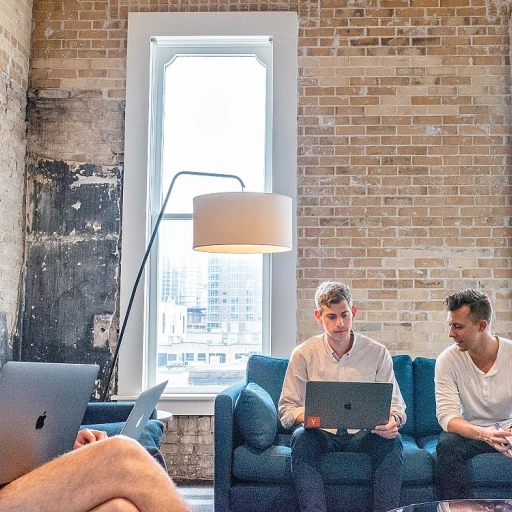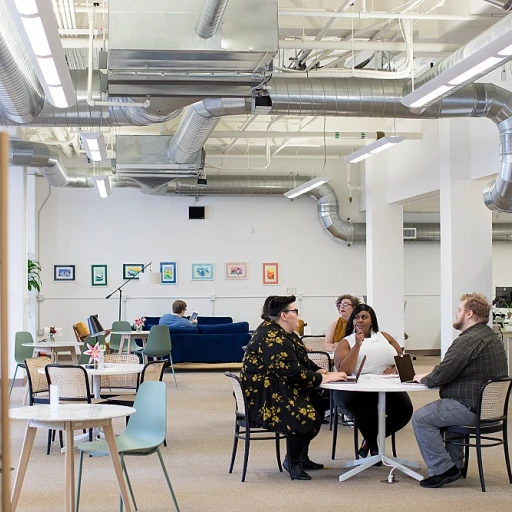
Redefining the Traditional Office
Transforming Workspaces to Meet Future Demands
In an era where the future of workspaces is rapidly evolving, leading financial institutions like JPMorgan are spearheading the transformation of traditional office settings. As businesses worldwide navigate the complexities of modern employment, there is a growing need to redefine what an office should be to foster both productivity and innovation. By addressing this need, JPMorgan ensures they remain competitive in the ever-changing landscape. Traditional workspaces, once rigid and hierarchical, are now shifting towards more open and flexible layouts. These changes not only facilitate collaboration but also reflect the broad shift towards incorporating equity in workspace design, a key consideration for companies like JPMorgan Chase and other financial giants. With jobs increasingly open to global talent, accommodating diverse work styles is not just an option but a necessity. Additionally, organizations are recognizing the value of integrating modern workspace solutions to support new ways of working. Open floor plans, collaborative hubs, and technologically enhanced environments are just some of the innovative changes being made. Such configurations not only improve employee experience by promoting creativity and interaction but also address efficiency needs. Human resources departments are playing a pivotal role in this transition, managing real estate strategies while ensuring that new designs align with business goals and employee preferences. By doing so, they uphold the privacy policy standards and equity compensation frameworks that are crucial for maintaining trust among employees. The shift toward hybrid work models deeply entwined with advanced technology underscores the imperative to continuously rethink management approaches and client services. As such, businesses are not just modifying physical spaces but are also pioneering new financial education and employee equity programs that reflect the holistic transformation of workspace ethos. In essence, the redefinition of traditional offices is far more than a mere structural change; it is a strategic response to global pressures and opportunities within the financial services sector. As JPMorgan and its contemporaries pave the way forward, the insights gathered from these transformations will undoubtedly shape the broader narrative of future workplaces.Integrating Advanced Technology
Technological Advancements Transforming Offices
In the evolving landscape of modern workspaces, the integration of advanced technology is not merely an option but a necessity. As financial institutions like JPMorgan aim to redefine their business environments, leveraging technology becomes pivotal in creating efficient, equitable, and flexible workplaces. The adoption of Citrix workspace solutions has become prominent in enhancing efficiency in future workspaces. By providing seamless access to applications and data, these solutions enable employees to work efficiently from any location, ensuring that financial services remain uninterrupted and efficient. This structure supports both remote and hybrid work models, which are becoming increasingly vital in today’s dynamic work environment. Moreover, the rise of advanced communication tools helps JPMorgan management teams to stay connected with global clients and employees across different regions. Tools facilitating virtual collaboration allow for open discussions, promoting a culture where employees can share innovative ideas irrespective of their physical location. Such platforms also uphold privacy policy standards, ensuring that client information and financial data remain secure. The role of technology in improving the employee experience cannot be overstated. Wearable technology and AI-driven insights offer financial and real estate managers the ability to monitor workspace utilization, leading to a more tailored workplace approach. Such insights help businesses like JPMorgan chase efficiency goals while enhancing the well-being of their human resources. Ultimately, technology offers the opportunity to transform traditional offices into dynamic environments that support productivity and innovation. As JPMorgan continues to invest in technological integration, the ability to adapt and respond to evolving business needs and employee expectations grows, ensuring a competitive edge in the global financial marketplace. For a deeper dive into the intricacies of navigating this technological transformation, refer to insights available on the technical workplace future.Prioritizing Employee Well-being
Nurturing a Holistic Work Environment
In today's fast-paced corporate landscape, a pivotal aspect of reshaping the traditional workspace revolves around focusing on employee well-being. By fostering a supportive environment, companies like JPMorgan are acknowledging that the productivity and satisfaction of the workforce are tightly intertwined. This approach extends beyond simply offering gym memberships or health plans, diving deep into creating a holistic workspace that considers physical, emotional, and mental health.
A principal factor in this initiative is developing workspace solutions that address both individual needs and team dynamics. These solutions often involve using advanced technology, as highlighted earlier, but always with an eye toward enhancing employee equity and management practices. The balance between providing high-level business services and ensuring the personal well-being of employees is paramount.
Moreover, the focus on employee equity and diversity is critical to fostering an inclusive office environment. Ensuring that all employees feel valued and represented can enhance morale substantially. The shift towards remote and hybrid work models, discussed in other parts of this exploration, further demonstrates the emphasis on flexibility and understanding diverse employee needs.
Research has shown that a supportive office environment can lead to a more engaged workforce, thereby contributing positively to the financial outcomes of the company. As financial services firms like JPMorgan navigate the evolving business landscape, they are increasingly recognizing the importance of integrating human resources strategies that prioritize the employee experience.
This employee-centric approach not only helps attract top talent but also assists in retaining it, in a fiercely competitive job market where jobs open up frequently. With such a significant focus on maintaining a balanced workplace, JPMorgan underscores the integral role well-being plays in their overall business strategy, reinforcing their commitment to being a leader in morgan workplace solutions and financial services management.
Embracing Remote and Hybrid Work Models
Adapting to New Work Models
The shift towards remote and hybrid work models is reshaping the landscape of modern workspaces. As businesses like JPMorgan Chase explore these models, they are redefining what it means to work in a financial services environment. The integration of advanced technology, as previously discussed, plays a crucial role in facilitating this transition, enabling seamless communication and collaboration across various locations.
Remote work offers employees flexibility and autonomy, allowing them to balance personal and professional responsibilities more effectively. However, it also presents challenges in maintaining team cohesion and ensuring equitable access to resources. Companies are addressing these issues by investing in workplace solutions that prioritize employee experience and equity. For instance, Citrix Workspace and similar platforms provide secure access to necessary tools and data, ensuring that remote employees can perform their jobs efficiently.
Hybrid Work: A Balanced Approach
Hybrid work models combine the best of both worlds, offering employees the opportunity to work from home while also utilizing office spaces for collaboration and team-building activities. This approach not only enhances productivity but also supports employee well-being, a priority for organizations aiming to retain top talent. As highlighted in the discussion on employee well-being, creating a supportive work environment is essential for long-term success.
Financial institutions like JPMorgan are also considering the implications of hybrid work on real estate and office design. By optimizing workspace usage, they can reduce costs and invest in creating more sustainable and efficient environments. This aligns with the broader trend of sustainability in workspace design, which is becoming increasingly important in the business world.
Opportunities and Challenges Ahead
As companies navigate the complexities of remote and hybrid work, they must also address potential challenges such as data security, management of remote teams, and maintaining a strong corporate culture. Effective management strategies and clear privacy policies are essential to ensure that these new work models are successful.
In conclusion, the future of workspaces at JPMorgan and similar organizations will be defined by their ability to adapt to these evolving models. By embracing change and investing in innovative solutions, they can create a more dynamic and resilient workplace that meets the needs of both employees and clients.
Sustainability in Workspace Design
Sustainability in Workspace Design at Morgan Chase
As workplaces evolve, sustainability has emerged as a pivotal consideration for companies like Morgan Chase. In light of environmental challenges, the financial services industry recognizes the need to implement solutions that are both eco-friendly and economically viable. Incorporating sustainable practices in workplace solutions not only supports environmental goals but also enhances the employee experience and overall client satisfaction.
The transition towards sustainable workspace design includes investing in resource-efficient technologies and materials. This means utilizing energy-saving systems and materials that minimize environmental impact. The workspace can become a model of conservation, reducing energy consumption and utilizing sustainable materials wherever possible.
Furthermore, real estate management within Morgan's workplaces has taken a progressive step by adopting green certifications and adhering to rigorous environmental standards. This approach promotes not only operational efficiency but also aligns with global shares in the sustainability agenda.
Employee well-being is intricately linked to the sustainable aspects of their workplace environment. Building designs that prioritize natural lighting, better air quality, and open spaces contribute to a healthier, happier workforce. Moreover, these sustainable elements help maintain privacy policy standards and share benefits related to employee equity, ultimately enhancing the collective human resources strategy.
Through financial education and intentional design, Morgan payments divisions alongside other financial sectors in the company integrate equity-focused strategies to ensure all employees benefit from sustainable measures. This holistic approach reflects Morgan's commitment to a more sustainable future, not just for its workplace but for the communities it serves as well.













